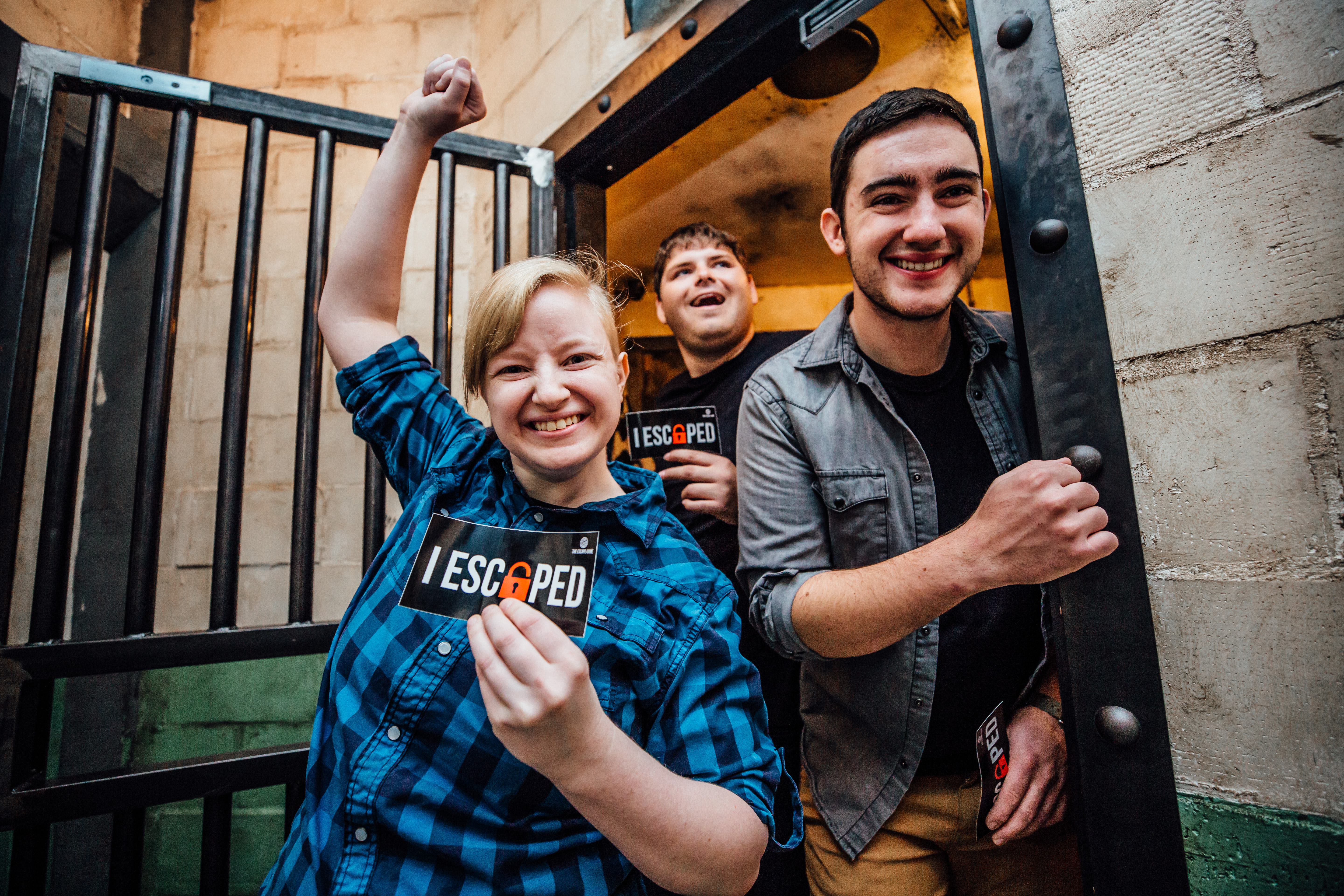Whether your team is new or has been working together for years, team building is a chance to get everyone out of a typical office setting and do something fun that can teach your team valuable, applicable lessons. An escape room is the perfect team-building activity. Here are 6 reasons why.
1. Find Strengths And Weaknesses
The most valuable thing that team building can reveal is the strengths and weaknesses of the individuals on your team and those of your team as a whole. You don’t want to get into crunch time on a project and discover that your team is horrible at communication, or wait until it’s time to present your big presentation to realize that you don’t have a team leader. Team building allows each member of your team to discover his or her own unique strengths and utilize them in a fun and safe environment. Team building allows you to discover gaps in your team’s communication before it becomes an issue and can allow leaders to emerge among you. (hate this) Escape rooms are perfect corporate team building activities because they get everyone on the team working together towards a common goal. The only difference between your team at an escape game room and your team at the office is that goal might be stealing a priceless work of art instead of crushing that 3 pm deadline. If your team needs to improve their communication, an escape room will give them the opportunity to work out the kinks by solving fun interactive puzzles. Throughout our years of experience designing rooms, escaping rooms, and watching people escape our rooms, we have found 5 main types of escapers: Spotters, Orchestrators, Communicators, Brains, and Tinkerers. Not all teams are made of one of each of these types of escape artists, but most successful teams are made of players who mix and match these skills and traits.

The Spotter: Quick and nimble, they’re always the first to search a room and leave no stone unturned in their quest to find clues. They are great at noticing details and collecting clues vital to solving puzzles. Teammates look to them to get them started in any new room. Spotters say things like, “Look there are numbers hidden in the paintings!” or “Give me the blacklight! I’ll find what’s invisible.”
The Orchestrator: They easily keep lots of complex information in their heads, hold tabs on the team’s progress, and contextualize it all within the larger story. They are skilled at delegating tasks, making sure teammates are spread out, and attempting to solve as many puzzles at a time as possible. Orchestrators say things like, “Tan, see if you can find where this code goes,” or “Toh, figure out what this design on the wall is supposed to be telling us.”
The Communicator: A great listener, they can quickly assimilate new information and relay it back to their teams, keeping everyone on the same page. They are great at making sure everyone is working together towards the same goal, and no one is stuck trying to figure out a clue that has already been used. Communicators say things like, “Have we used this code yet? Yes? Ok, that code is done,” or “Ok, I’m making a pile of puzzle pieces over here. Whenever you find more, that’s where they’ll be.”
The Brain: They have a mind for analytics and are adept at discovering patterns, solving challenges, and cracking codes. They are the master of puzzles, and their teammates look to them when they find clues that they can’t decipher. Brains say things like, “I think this map shows us how to configure the wires, but we’re missing a few pieces,” or “Ok, I think we should arrange the mirrors like this so that the laser can point into that hole over there.”

The Tinkerer: Naturally curious, they have the patience and perspective to view a challenge from different angles until they arrive at that “aha” moment. While others might get frustrated when they can’t solve a puzzle on the first try, Tinkerers don’t get discouraged. They keep fiddling and trying new things until they figure it out. Tinkerers say things like, “Oh! I think we were looking at it upside down?” or “Ah! That piece fits perfectly on the wall, right there. Let’s try that!”
A great debriefing activity after an escape room is to discuss which type and skills each person most displayed in the room. This helps identify and call out to the whole team the strengths you discovered in each teammate. Imagine what this exercise could help you discover about your team!
2. Learn To Communicate
Communication is key to any successful team. Whether you are getting through a Monday morning meeting with your coworkers or helping to prepare a big presentation, making sure that everyone is on the same page is extremely important. You don’t want to be duplicating someone else’s work or spending significant time going down a path that will not be productive for your team. Escape games help you develop vital communication skills in a high intensity, low stakes environment that is not make or break for your bottom line. Teams must work together not only to find clues but also to figure out how they fit together across different puzzles. Just like in a work setting, communication is also a terrific time-saver in an escape room, as players need to avoid wasting time by redoing puzzles or retrying strategies that have already not worked for other team members. Ultimately, doing an escape room is a great way to find out how well (or poorly) your team communicates under pressure, and it also gives you an opportunity to develop those skills.

3. Learn How To Win (And Lose) Together
As a team in the workplace, the outcome of any project, presentation, or competition is shared. Sometimes you win the big contract, and sometimes your proposal is rejected by the committee. Win or lose, you did the work together and will face the consequences together. This lesson is valuable for teams to learn and internalize so that each person feels that they contribute to the larger mission of the team and that their work is important to the overall outcome. Team building at escape rooms is an experience that can quickly and effectively help your team feel like a team. The immersive worlds in escape rooms will heighten the urgency of your challenge, with the clock ticking down and everyone working towards your final goal. Most importantly, either everyone escapes or no one does–no one can succeed (or fail) alone.
4. Build Trust
One of the most important parts of team building is the opportunity it affords your team to build trust quickly. Though the age-old activity for this is a standard trust fall, isn’t there a better way to build relationships? Will performing trust falls really tell you if you will be able to work efficiently and effectively with your coworkers? Maybe not. What you really need to be able to trust your teammates with is the work they contribute to your projects or your everyday office environment. Can you trust them to be capable and helpful? Can you trust them to be persistent and collaborative? These are questions you can’t answer with a trust fall, but you can answer in an escape room. After you’ve escaped a room with your team, you can have faith that Tan and Toh can successfully tackle any project together, since they worked so well together figuring out that puzzle that no one else understood. And Dave was great at encouraging your team and keeping everyone on task, so you will have no trouble following his lead at the office. The trust you build in an escape room is just the kind of trust you need.

5. Get To Know Each Other Better
According to Plato, “You can discover more about a person in an hour of play than in a year of conversation.” The best way to get to know different aspects of your teammates is to see them in different environments. Seeing the same people in the same office setting every day allows you to get into a routine of how you act and what you talk about. Team building activities, however, push you out of your comfort zone and allow you to react to new challenges. Maybe you had no idea that James could speak Russian, but when he recognized those symbols in the spaceship, it really helped speed up your ability to solve that puzzle. Maybe you have never spoken more than five words to Katie from accounting, but then you worked together on a complicated puzzle and you learn that she’s hilarious. And what about Kevin? He is usually so quiet, but as soon as you got into that room, he was dishing out orders left and right. Regardless of who shines and how, you will definitely come out of team building at an escape room with an all-new perspective on some of your team members.
6. Share Memories And Experiences– Have Fun!!
Team building gathers everyone outside of the office and creates memories for teammates to share that are not necessarily work-related. If the best memory you have with your coworkers is that one time that someone left an entire pizza unattended in the break room, you need to get out of the office and have fun with your team. We’re not saying you will all be best friends after team building at an escape game together, but we know you will have fun memories that you can fall back on in stressful times. Those memories will bring the team together and maybe even help set the tone for future team projects. When you are all rushing to finish a project and tensions are high, it can help to look back and remember that you have already worked together successfully and had fun doing it. After all, if you can escape prison together, surely you can complete your monthly budget report on time!
